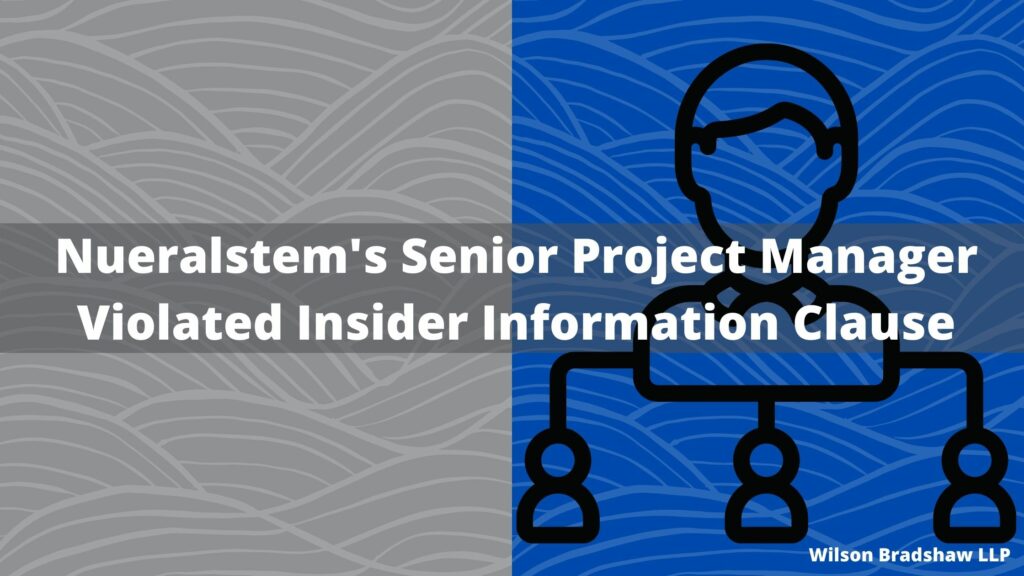On June 7th, 2021, the Security and Exchange Committee (“SEC”) announced[1] a charge against Holly Hand, a former senior project manager at Neuralstem, a biopharmaceutical company currently known as Palisade Bio, Inc., and her intimate Chad A. Calice with violating the insider trading policy. Hand provides Calice with Neuralstem’s unpublic information, resulting in Calice avoiding the losses of $103,875 and his uncle $14,434. The charge was settled, with the defendants agreeing to pay a $325,000 civil penalty.
In the complaint[2], the SEC alleged that Hand informed Calice about a Neuralstem’s clinical trial’s negative result in a phone call on Friday, July 21st, 2017, and Calice subsequently sold all Neuralstem’s stock on the following Monday and told his uncle to do so. Neuralstem publicly announced the result of its clinical trial on Tuesday morning before the market opened, and its stock price drop approximately 50%, from the previous day’s close of $5.58 to $2.81 per share. After the drop, Calice repurchases Neuralstem’s stock at a lower price.
Hand leaked a piece of non-public material information to Calice with the expectation to benefit Calice by giving it an unfair advantage that no other Neuralstem’s shareholders have access to. Hand and Calice have a close relationship: they have lived together for many years in a house they purchased together and share the mortgage. In addition, Hand frequently discusses her work with Calice, causing him to know about the clinical trial, especially its dates of significance. Hand and Calice should be well aware of the confidentiality of the information they were communicating but nonetheless decide to benefit from it.
Neuralstem’s protocol and the industry’s standard demands material information regarding clinical trials to be kept confidential until formal public announcement. Employees who have access to this kind of information are strictly prohibited from sharing it with individuals or organizations outside their company. When disclosing such information with outsiders is necessary, employees must acquire written agreements to comply with the company’s insider trading policy from whom they disclose the information. Hand-signed the company’s confidentiality agreement and annual acknowledgment pledging to abide by the ethics code as recently as February 6th, 2021.
However, she broke these codes when she discussed the result of the clinical trial with Calice. Furthermore, when he was questioned for suspicious trades put through Calice’s account, Hand lied to the Neuralstem’s investigator, falsely denying that she did not discuss Neuralstem’s study before its public announcement. Calice and Hand’s conducts described hereby violates section 17(a) of the Securities Act of 1933 and section 10(b) of the Securities and Exchange Act of 1934.
Richard R. Best, Director of the SEC’s New York Regional Office, says, “[p]ublic company employees owe shareholders a duty to safeguard the confidentiality of company information and not to personally benefit, directly or indirectly, from the misuse of such information. He also says, “the complaint alleges that Hand improperly shared confidential information with Calice, allowing him to trade on and benefit from the information that other Neuralstem shareholders did not possess.
While it is not uncommon to have access to sensitive information when working for public companies, it is critical to observe the related regulations closely. We strongly advise people who have doubts when complying with these regulations to seek professional legal counsel.
Wilson Bradshaw LLP is a boutique securities law firm in Irvine, California, and New York City. We offer the advantage of a highly focused, experienced legal team that understands business realities. Our practice is dedicated to helping businesses prosper by providing cost-effective services without compromising quality. Please visit our website or contact us through email for anything you need.
Reference:
[1]: https://www.sec.gov/news/press-release/2021-94
[2]: https://www.sec.gov/litigation/complaints/2021/comp-pr2021-94.pdf

